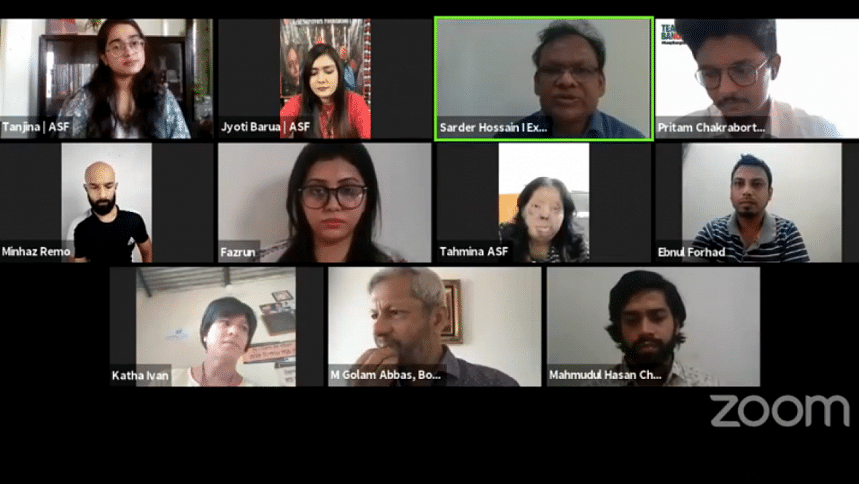ASF organises ‘Role of Youth Workers in Preventing Violence’

Acid Survivors Foundation (ASF) organised a webinar themed around International Youth Day, titled "Role of Youth Workers in Preventing Violence", on August 31, via Zoom. It was broadcast live from their Facebook page.
The event was inaugurated with a few words from the executive director of ASF, Sarder Jahangir Hossain. "We have many interns from abroad universities who work with us so I thought why not include Bangladeshi students as well," reveals the executive director. "We lost 60% of our staff in these stressful coronavirus recessions, but fortunately the youth were beside us."
Many accomplished names amongst youth changemakers attended the webinar as guest speakers, including Amina Khatun Neela, Senior Officer, Gender Responsive Education, and Skill Project, Gender Justice and Diversity, BRAC, Minhaz Remo, Founding Performance and Nutrition Coach of Functional Performance, Ivan Ahmed Katha, Founder of Kotha Kala Kendra, Mahmudul Hasan Chowdhury, Psychosocial Support Officer, Save the Children, amongst many others. They shared their stories and insights to better eliminate violence and related crimes.
"I am an acid survivor myself and have formerly worked with ASF," says Amina Khatun Neela. "Society usually blames the acid victim after the heinous incident takes place, leaving no place for the victim to express oneself, which becomes their biggest trauma."
"I am a martial arts specialist working with self-defense and security of women. Most cases of abuse usually come from a known face," shares Minhaz Remo. "Even after knowing the tactics to save themselves, many do not have the mental strength to use them in actual situations against the abusers."
Mahmudul Hasan Chowdhury, a psychological support officer for Save the Children, also shared his thoughts. "A physically or psychologically challenged person tends to fear opening up to others," he says. "Usually, even if I get them to open up to me, getting their consent to initiate the next step is difficult due to some social stigmas and constraints."
To bring injustice upfront and protest against it Swatil Binte Mahmud, founder of the youth-based platform, Swayong and her team have been working relentlessly. "Rape and violence cases are often presented as numbers or bullet points in news and reports, be it online or offline," added the social activist. "We present their stories our Swayong platform and aiming to dismantle the injustice."
M Golam Abbas, a member of the Board of Trustees (BoT), ASF, expressed his thoughts. "We are discussing a huge area which concerns violence, and we need to focus on the microscopic areas like advocacy, awareness, and economic support," says M Golam Abbas. "Seeing so many youth-based foundations working to prevent this, we hope to build a collaborating youth network and connect the victims to them for any kind of necessary support."
"We can reach out to government sectors like Ministry of Women and Children Affairs, exploring the law and advocacy support from them," says Dr Julia Ahmed, BoT, ASF. "After meeting so many organisations and hearing their stories, our next step is to design a collaborated plan of action in the next webinar."
The webinar ended with the Spanish slogan, "El Pueblo Unido Jamás Será Vencido", which means "United we stand, divided we fall."

 For all latest news, follow The Daily Star's Google News channel.
For all latest news, follow The Daily Star's Google News channel. 



Comments